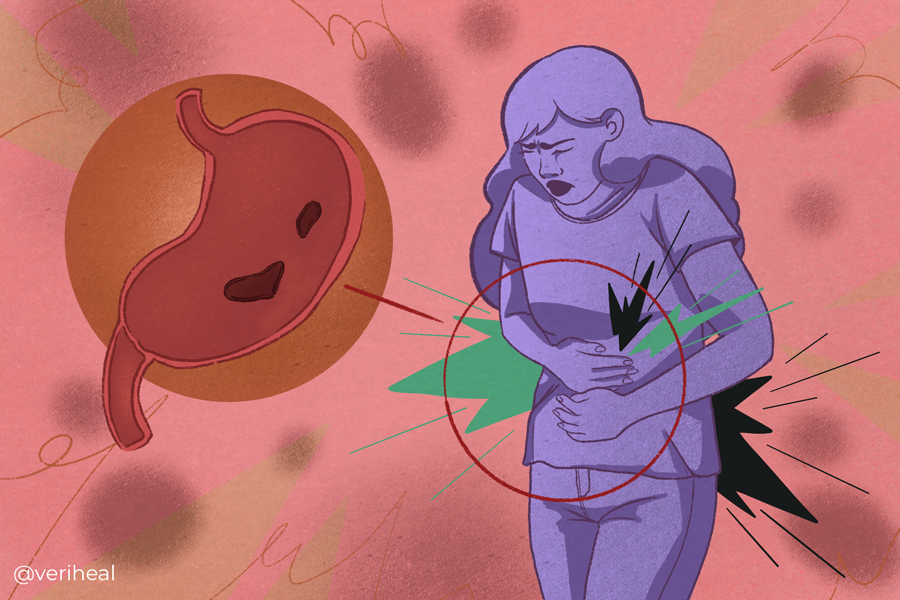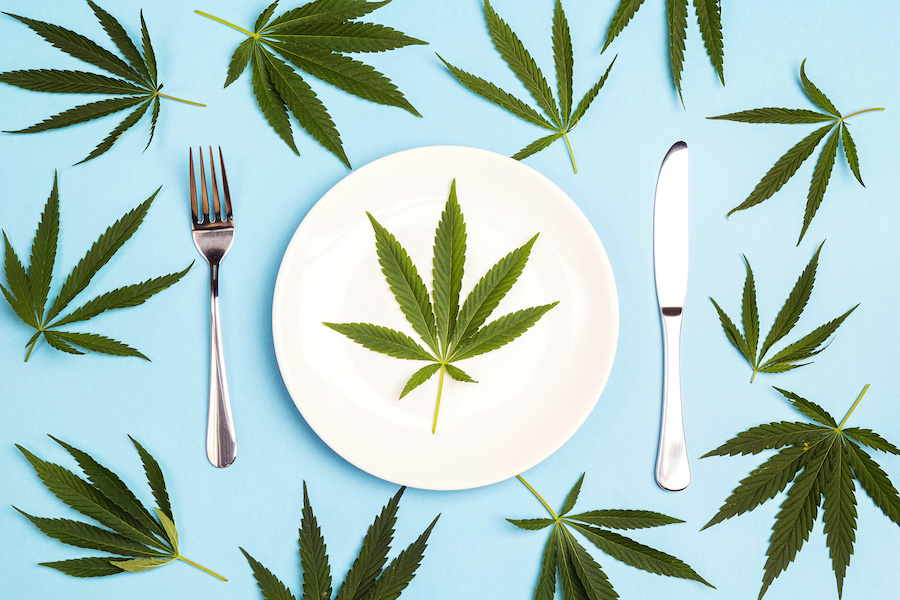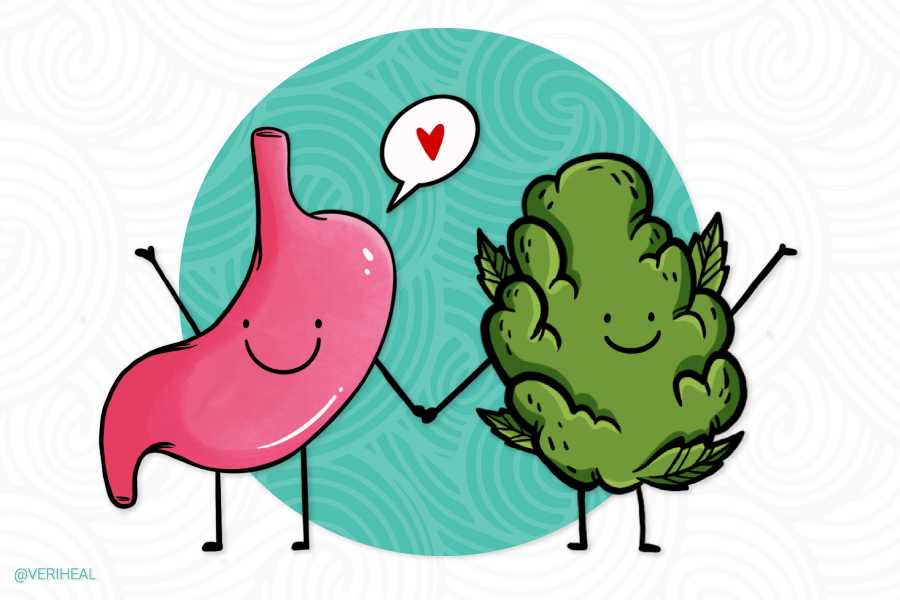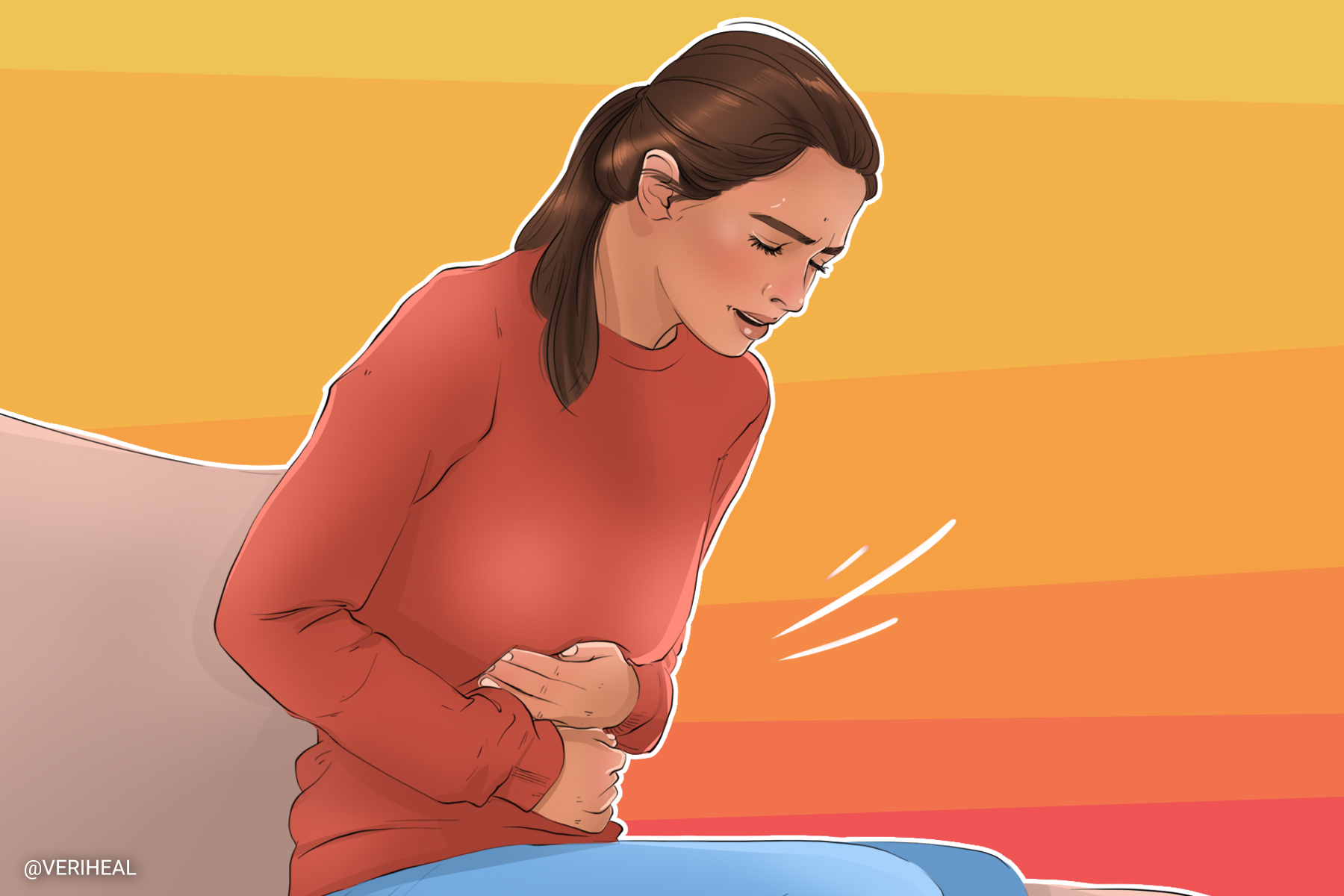Marijuana May Help Patients Suffering from Stomach Ulcers

What You Need To Know: Cannabis for Stomach Ulcers
Although direct research on cannabis’s impact on stomach ulcers is limited, emerging evidence suggests potential benefits. Cannabis, with its various cannabinoids such as CBD and THC, interacts with the body’s endocannabinoid system, potentially affecting pain perception, appetite, and gut function. Studies indicate that cannabis may slow gastric acid production, alleviate inflammation, and relieve gastrointestinal pain associated with ulcers.
Historical uses of cannabis in traditional medicine, such as in Réunion and Argentina, further highlight its potential in managing stomach-related issues. However, it’s crucial to note that cannabis is not a cure or approved treatment for peptic ulcers, and consultation with a healthcare provider is necessary to determine appropriate treatment plans. While preliminary research suggests promising effects of THC in animal studies, larger controlled trials are needed to confirm its benefits and long-term effects in humans.
Moreover, cannabis’s role in managing conditions like GERD and its potential impact on bronchoconstriction warrant further investigation. Overall, while cannabis shows promise in addressing ulcer-related symptoms, comprehensive research and medical supervision are essential for safe and effective management of stomach ulcers.
- Treating Stomach Ulcers with Medical Cannabis
- Ulcers and Cannabis: Considerations to Keep in Mind
- Peptic Ulcer Causes
- What Does the Research Say About Ulcers and Medical Cannabis?
Cannabis has long been known for its ability to help ease nausea and stomach pain, two trademark symptoms of stomach ulcers. Also known as peptic ulcers, stomach ulcers and small intestine ulcers can make life miserable for those who have them. While there aren’t many studies that have looked into the effect of cannabis on stomach ulcers directly, we do know that it has the ability to slow gastric emptying through the slowing of peristalsis, or digestive movements (10). It also has been used to relieve intestinal pain in Crohn’s disease, ulcerative colitis, and irritable bowel syndrome (IBS).
Cannabis contains hundreds of cannabinoids; the most well-known and medicinal ones include cannabidiol (CBD) and Δ9-tetrahydrocannabinol (THC). Researchers believe that these chemicals interact with the body’s endocannabinoid system (EC), which consists of self-made, fat-based neurotransmitters. A few of the most well-studied endocannabinoids include anandamide (AEA) and arachidonoylglycerol (2-AG). When cannabis enters the body, it connects with CB1 and CB2 receptors in the body where it can increase or decrease endocannabinoid levels that can affect the immune system, pain perception, appetite, gut function, and more (6).
Researchers believe that through the activation of CB1 receptors in the stomach, cannabis use can slow gastric or stomach acid production which may help relieve some ulcer symptoms (10). There is also evidence that medical cannabis can help treat gastrointestinal pain, abdominal pain, and inflammation (5).
For more information on how the endocannabinoid system works, please see our page on endocannabinoids here.
Treating Stomach Ulcers with Medical Cannabis
Using medical cannabis can help treat stomach ulcers along with traditional medical treatments. Cannabis can help your stomach with the following (6):
- Suppressing gastric acid secretions, relieving heartburn (10)(1)
- Regulating your appetite
- Calming nausea (10)(11)
- Boiled cannabis root has been historically used in Réunion, a French island in the Indian ocean, to protect against vomiting. Cannabis plant bark has also been mixed with wine in Argentina for stomach pain and weakness (11). It has been thought that this removes toxins and infections in the stomach.
- Reducing inflammation caused by stomach acid
- Reduces intestinal pain
Ulcers and Cannabis: Considerations to Keep in Mind
Cannabis is not a cure or approved treatment for peptic ulcers, and you will need to talk with your doctor to determine the source of your ulcer. If you have health concerns, it is important to first rule out any other potential complications like intestinal bleeding, digestive tract perforation, or cancer with the advice of your provider. Inappropriately treated and long-standing GERD can lead to Barrett’s Esophagus (precancerous esophagus), and eventually stomach cancer.
Cannabis may help with inflammation and pain from a stomach ulcer, but it is important to consult with your doctor as you may need medications including antacids or proton pump inhibitors, lab monitoring, or even endoscopic evaluation (by EGD or colonoscopy) for evaluation and treatment.
Peptic Ulcer Causes
It is known that gastritis, gastric erosion, and subsequent stomach ulcers can be caused by too much stress, spicy foods, smoking, and alcohol. Your diet, smoking and drinking habits, and stress levels can potentially cause or irritate an ulcer anywhere in your stomach or duodenum, the first portion of the small intestine (4). Other common factors that cause ulcers around the world are:
Helicobacter Pylori
Helicobacter Pylori, also known as H. pylori, is a type of bacteria that causes most stomach ulcers (12). The U.S. National Library of Medicine (NIH) estimates that between 30-40% of people in the United States get an H. pylori infection, but in most cases, it does not cause symptoms (14). This bacterium attacks the mucus that lines the inside of the stomach and the duodenum and can lead to stomach ulcers, gastritis or stomach inflammation, and stomach cancer.
Your doctor may suggest an H. pylori breath test or a stool test in order to determine if this caused your ulcer or gastritis. It is important to note that medical marijuana alone is not able to cure this bacterial infection and that you will likely need a combination of antibiotics to treat the infection. H. pylori infections can be prevented by exercising proper handwashing techniques and practicing routine safe food and water hygiene (14).
NSAIDs
Non-steroidal anti-inflammatory drugs (NSAIDs) are medications such as ibuprofen, aspirin, and naproxen that are used to treat pain, inflammation, and fevers. Many people take these medications with no problems, but your risks for stomach erosion, anemia, inflammation, and peptic ulcers are increased if you have been taking these medications for a long time and/or at higher doses (15).
What Does the Research Say About Ulcers and Medical Cannabis?
Fundamental animal studies have shown that THC used in higher concentrations in rats and other animals can slow pentagastrin and histamine-induced acid secretion. One study saw that in rats with induced gastric ulcers, administering 100 mg/kg of THC reduced the formation of the ulcers after six hours (10).
Stomach acid secretion changes have been connected to the lower stomach acid levels in cannabis users as part of a 90-participant human study. This study tested human subjects that smoked more than two days a week and the stomach acid secretion levels after the users stopped smoking (10). This research suggests that gastric or stomach ulcers could be prevented with the use of THC in humans as well. Larger, well-controlled randomized trials are needed to confirm the potential benefits and long-term effects of THC for gastric disorders.
According to a review in Cannabis and Cannabinoid Research, there are also several studies that support the use of cannabis in reducing inflammation and mucosal damage of the stomach lining in patients with gastroesophageal reflux disease (GERD) as well as anti-inflammatory effects in the esophagus and relaxation of the lower esophagus (6).
Researchers believe that CB2 receptors may also improve bronchoconstriction, a contributing factor in the chronic cough commonly developed by GERD patients and smokers (6). GERD and peptic ulcers are potentially serious conditions that need proper ongoing treatment and medical surveillance.
Note: Veriheal does not intend to give this as professional medical advice. Do not attempt to self-diagnose, or prescribe treatment based on the information provided on this page. Always consult a physician before making any decision on the treatment of a medical condition.
1. Abdel-Salam, O. (2016). Gastric acid inhibitory and gastric protective effects of Cannabis and cannabinoids. Asian Pacific Journal of Tropical Medicine, 9(5), 413–419. https://www.sciencedirect.com/science/article/pii/S1995764516300712
2. Calabrese, C., Spisni, E., Liguori, G., Lazzarini, G., Valerii, M. C., Strillacci, A., Gionchetti, P., Pagotto, U., Campieri, M., & Rizzello, F. (2010). Potential role of the cannabinoid receptor CB1 in the pathogenesis of erosive and non-erosive gastro-oesophageal reflux disease. Alimentary Pharmacology & Therapeutics, 32(4), 603–611. https://onlinelibrary.wiley.com/doi/full/10.1111/j.1365-2036.2010.04377.x
3. De Souza, H., Trajano, E., Carvalho, F. V., & Palermo Neto, J. (1978). Effects of Acute and Long-Term Cannabis Treatment on Restraint-Induced Gastric Ulceration in Rats. Japanese Journal of Pharmacology, 28(3), 507–510. https://www.jstage.jst.go.jp/article/jphs1951/28/3/28_3_507/_article/-char/ja/
4. Gastritis: Indigestion, symptoms, causes, treatment, diagnosis. Cleveland Clinic. (2020, September 8). https://my.clevelandclinic.org/health/diseases/10349-gastritis
5. Goldstein, B. (2020, September 28). Cannabis for Gastrointestinal Disorders: An excerpt from Cannabis is Medicine by Dr. Bonni Goldstein. Project CBD. https://www.projectcbd.org/medicine/cannabis-gastrointestinal-disorders
6. Gotfried, J., Kataria, R., & Schey, R. (2017). Review: The role of cannabinoids on esophageal function—what we know thus far. Cannabis and Cannabinoid Research, 2(1), 252–258. https://www.liebertpub.com/doi/10.1089/can.2017.0031
7. Levy, J., Buhl, K., Fernandez, C., & Kumaraswamy, J. (2020). Does Smoking Cannabis Increase the Risk of Barrett’s Esophagus? Cureus. https://www.cureus.com/articles/26805-does-smoking-cannabis-increase-the-risk-of-barretts-esophagus
8. Medical Cannabis. Gastrointestinal Society. (2020, August 12). https://badgut.org/information-centre/a-z-digestive-topics/cannabis/
9. Peptic Ulcer Disease. American College of Gastroenterology. (2021, May 27). https://gi.org/topics/peptic-ulcer-disease/
10. PERTWEE, R. G. (2001). Cannabinoids and the gastrointestinal tract. Gut, 48(6), 859–867. https://www.ncbi.nlm.nih.gov/pmc/articles/PMC1728337/
11. Ryz, N. R., Remillard, D. J., & Russo, E. B. (2017). Cannabis Roots: A Traditional Therapy with Future Potential for Treating Inflammation and Pain. Cannabis and Cannabinoid Research, 2(1), 210–216. https://www.liebertpub.com/doi/10.1089/can.2017.0028
12. Stomach and Duodenal Ulcers (Peptic Ulcers). Johns Hopkins Medicine. (n.d.). https://www.hopkinsmedicine.org/health/conditions-and-diseases/stomach-and-duodenal-ulcers-peptic-ulcers
13. U.S. Department of Health and Human Services. (n.d.). Symptoms & Causes of Peptic Ulcers (Stomach Ulcers). National Institute of Diabetes and Digestive and Kidney Diseases. https://www.niddk.nih.gov/health-information/digestive-diseases/peptic-ulcers-stomach-ulcers/symptoms-causes
14. U.S. National Library of Medicine. (2021, May 5). Helicobacter Pylori Infections. MedlinePlus. https://medlineplus.gov/helicobacterpyloriinfections.html
15. NHS. (2018, September 17). Stomach Ulcer Causes. Nhs choices. https://www.nhs.uk/conditions/stomach-ulcer/causes/
















